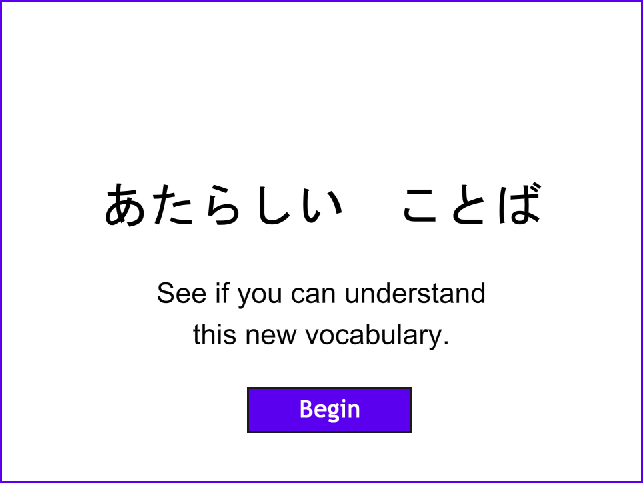![]() New Verbs
New Verbs
Click presentation or click Begin below to watch and listen about verbs. Practice your new vocabulary here. See if you know what the words mean.
Here is a print version of this actvity. You will still need to use the online version to hear any audio.
Vocabulary Practice
Practice your new vocabulary here. See if you know what the words mean. Click each link.
| かんがえます | to think |
| ドアを しめます | to close the door |
| ドアを あけます | to open the door |
| ごはんを つくります | to fix a meal |
| わかります | to understand |
| べんきょうします | to study |
| うたを うたいます | to sing a song |
| スキーが できます | to be able to ski |
| つかいます | to use |
| かちます | to win |
![]() Plain Present Affirmative Form of Verbs
Plain Present Affirmative Form of Verbs
Plain present affirmative form is sometimes called "dictionary form." When you look up a word in a Japanese dictionary, all verbs are listed in this form. Plain form is also used in casual speech among family and between friends, as you will learn later. In addition, plain form is used to express things you like or dislike doing, or to express reasons or causes.
You see some plain form of verbs in the chart below. Guess what the polite form (ます-form) of each verb is. Click each link and see if your guess is correct.
ごはんを たべる たべます コーラを のむ のみます がっこうに いく いきます ともだちが くる きます ほんを よむ よみます テレビを みる みます いぬが いる います とけいが ある あります テニスを する します ペンが いる いります
![]() Plain Form Verbs
Plain Form Verbs
Let's do some activities to understand how each verb changes its form from plain form to polite form (ます-form). All plain form verbs below are spelled phonetically.
| iru, aru, miru, suru, iku, nomu, kuru, kaeru,yomu, taberu, tsukau, hashiru, utau, hairu, kangaeru, wakaru, dekiru, akeru, simeru, iru |
Read the following instruction and categorize each verb into the group that fits to the description. Take notes and click to see the answer when you finish the activity.
| 1. Find suru and kuru. | suru, kuru |
| 2. Find the verbs which do not end with either iru or eru. | aru, iku, nomu, yomu, tsukau, utau, wakaru |
| 3. Find the verbs which end with either iru or eru. | iru, miru, kaeru, taberu, hasiru, hairu, kangaeru, dekiru, akeru, simeru, iru |
![]() Types of Verbs
Types of Verbs
In Japanese, there are three types of verbs: Irregular verbs, うverbs and るverbs.
1. Irregular verbs: There are only two irregular verbs in Japanese. You need to memorize this irregular verb formation. Change into polite form.
| Plain form | Polite form |
| する | します |
| くる | きます |
2. うverbs: All the verbs which do not end with /iru/ or /eru/ are う verbs. Here is how the plain form changes into the polite form.
| Plain form | Polite form |
| ある | あります |
| いく | いきます |
| のむ | のみます |
| よむ | よみます |
| つかう | つかいます |
| うたう | うたいます |
| わかる | わかります |
う verbs: The ending sound /u/ becomes /imasu/ to change into the polite form.
3. る verbs: All the る verbs end with either /iru/ or /eru/. However, be careful: some う verbs end in either /iru/ or /eru/!
1) The followings are る verbs:
| Plain form | Polite form |
| いる | います |
| みる | みます |
| たべる | たべます |
| かんがえる | かんがえます |
| できる | できます |
| あける | あけます |
| しめる | しめます |
る verbs: The ending sound /ru/ becomes /masu/ to change into the polite form.
2) The verbs below are the う verbs. Can you see the same verb formation as the う verbs?
| Plain form | Polite form |
| かえる | かえります |
| はしる | はしります |
| はいる | はいります |
| いる | いります |
う verbs: The ending sound /u/ becomes /imasu/ to change into the polite form.
The verb いる means either "to have; to exist" or "to need." You can tell the meaning based on the context very easily.
| いる | ||
 |
||
| るverb Polite form:います to have; to exist |
うverb Polite form: いります to need |
![]() Graded Assignments
Graded Assignments
Please return to the Section 2 Tasks & Assignments folder to complete the graded assignments for Section2, Part A.


